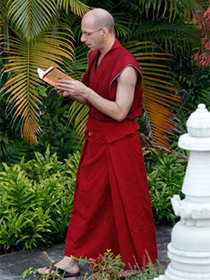- Home
- FPMT Homepage
Foundation for the Preservation of the Mahayana Tradition
The FPMT is an organization devoted to preserving and spreading Mahayana Buddhism worldwide by creating opportunities to listen, reflect, meditate, practice and actualize the unmistaken teachings of the Buddha and based on that experience spreading the Dharma to sentient beings. We provide integrated education through which people’s minds and hearts can be transformed into their highest potential for the benefit of others, inspired by an attitude of universal responsibility and service. We are committed to creating harmonious environments and helping all beings develop their full potential of infinite wisdom and compassion. Our organization is based on the Buddhist tradition of Lama Tsongkhapa of Tibet as taught to us by our founders Lama Thubten Yeshe and Lama Thubten Zopa Rinpoche.
- Willkommen
Die Stiftung zur Erhaltung der Mahayana Tradition (FPMT) ist eine Organisation, die sich weltweit für die Erhaltung und Verbreitung des Mahayana-Buddhismus einsetzt, indem sie Möglichkeiten schafft, den makellosen Lehren des Buddha zuzuhören, über sie zur reflektieren und zu meditieren und auf der Grundlage dieser Erfahrung das Dharma unter den Lebewesen zu verbreiten.
Wir bieten integrierte Schulungswege an, durch denen der Geist und das Herz der Menschen in ihr höchstes Potential verwandelt werden zum Wohl der anderen – inspiriert durch eine Haltung der universellen Verantwortung und dem Wunsch zu dienen. Wir haben uns verpflichtet, harmonische Umgebungen zu schaffen und allen Wesen zu helfen, ihr volles Potenzial unendlicher Weisheit und grenzenlosen Mitgefühls zu verwirklichen.
Unsere Organisation basiert auf der buddhistischen Tradition von Lama Tsongkhapa von Tibet, so wie sie uns von unseren Gründern Lama Thubten Yeshe und Lama Thubten Zopa Rinpoche gelehrt wird.
- Bienvenidos
La Fundación para la preservación de la tradición Mahayana (FPMT) es una organización que se dedica a preservar y difundir el budismo Mahayana en todo el mundo, creando oportunidades para escuchar, reflexionar, meditar, practicar y actualizar las enseñanzas inconfundibles de Buda y en base a esa experiencia difundir el Dharma a los seres.
Proporcionamos una educación integrada a través de la cual las mentes y los corazones de las personas se pueden transformar en su mayor potencial para el beneficio de los demás, inspirados por una actitud de responsabilidad y servicio universales. Estamos comprometidos a crear ambientes armoniosos y ayudar a todos los seres a desarrollar todo su potencial de infinita sabiduría y compasión.
Nuestra organización se basa en la tradición budista de Lama Tsongkhapa del Tíbet como nos lo enseñaron nuestros fundadores Lama Thubten Yeshe y Lama Zopa Rinpoche.
A continuación puede ver una lista de los centros y sus páginas web en su lengua preferida.
- Bienvenue
L’organisation de la FPMT a pour vocation la préservation et la diffusion du bouddhisme du mahayana dans le monde entier. Elle offre l’opportunité d’écouter, de réfléchir, de méditer, de pratiquer et de réaliser les enseignements excellents du Bouddha, pour ensuite transmettre le Dharma à tous les êtres. Nous proposons une formation intégrée grâce à laquelle le cœur et l’esprit de chacun peuvent accomplir leur potentiel le plus élevé pour le bien d’autrui, inspirés par le sens du service et une responsabilité universelle. Nous nous engageons à créer un environnement harmonieux et à aider tous les êtres à épanouir leur potentiel illimité de compassion et de sagesse. Notre organisation s’appuie sur la tradition guéloukpa de Lama Tsongkhapa du Tibet, telle qu’elle a été enseignée par nos fondateurs Lama Thoubtèn Yéshé et Lama Zopa Rinpoché.
Visitez le site de notre Editions Mahayana pour les traductions, conseils et nouvelles du Bureau international en français.
Voici une liste de centres et de leurs sites dans votre langue préférée
- Benvenuto
L’FPMT è un organizzazione il cui scopo è preservare e diffondere il Buddhismo Mahayana nel mondo, creando occasioni di ascolto, riflessione, meditazione e pratica dei perfetti insegnamenti del Buddha, al fine di attualizzare e diffondere il Dharma fra tutti gli esseri senzienti.
Offriamo un’educazione integrata, che può trasformare la mente e i cuori delle persone nel loro massimo potenziale, per il beneficio di tutti gli esseri, ispirati da un’attitudine di responsabilità universale e di servizio.
Il nostro obiettivo è quello di creare contesti armoniosi e aiutare tutti gli esseri a sviluppare in modo completo le proprie potenzialità di infinita saggezza e compassione.
La nostra organizzazione si basa sulla tradizione buddhista di Lama Tsongkhapa del Tibet, così come ci è stata insegnata dai nostri fondatori Lama Thubten Yeshe e Lama Zopa Rinpoche.
Di seguito potete trovare un elenco dei centri e dei loro siti nella lingua da voi prescelta.
- 欢迎 / 歡迎
简体中文
“护持大乘法脉基金会”( 英文简称:FPMT。全名:Foundation for the Preservation of the Mahayana Tradition) 是一个致力于护持和弘扬大乘佛法的国际佛教组织。我们提供听闻,思维,禅修,修行和实证佛陀无误教法的机会,以便让一切众生都能够享受佛法的指引和滋润。
我们全力创造和谐融洽的环境, 为人们提供解行并重的完整佛法教育,以便启发内在的环宇悲心及责任心,并开发内心所蕴藏的巨大潜能 — 无限的智慧与悲心 — 以便利益和服务一切有情。
FPMT的创办人是图腾耶喜喇嘛和喇嘛梭巴仁波切。我们所修习的是由两位上师所教导的,西藏喀巴大师的佛法传承。
繁體中文
護持大乘法脈基金會”( 英文簡稱:FPMT。全名:Found
ation for the Preservation of the Mahayana Tradition ) 是一個致力於護持和弘揚大乘佛法的國際佛教組織。我們提供聽聞, 思維,禪修,修行和實證佛陀無誤教法的機會,以便讓一切眾生都能 夠享受佛法的指引和滋潤。 我們全力創造和諧融洽的環境,
為人們提供解行並重的完整佛法教育,以便啟發內在的環宇悲心及責 任心,並開發內心所蘊藏的巨大潛能 — 無限的智慧與悲心 – – 以便利益和服務一切有情。 FPMT的創辦人是圖騰耶喜喇嘛和喇嘛梭巴仁波切。
我們所修習的是由兩位上師所教導的,西藏喀巴大師的佛法傳承。 察看道场信息:
- FPMT Homepage
- News/Media
-
- Study & Practice
-
-
- About FPMT Education Services
- Latest News
- Programs
- New to Buddhism?
- Buddhist Mind Science: Activating Your Potential
- Heart Advice for Death and Dying
- Discovering Buddhism
- Living in the Path
- Exploring Buddhism
- FPMT Basic Program
- FPMT Masters Program
- FPMT In-Depth Meditation Training
- Maitripa College
- Lotsawa Rinchen Zangpo Translator Program
- Universal Education for Compassion & Wisdom
- Online Learning Center
-
- Prayers & Practice Materials
- Overview of Prayers & Practices
- Full Catalogue of Prayers & Practice Materials
- Explore Popular Topics
- Benefiting Animals
- Chenrezig Resources
- Death & Dying Resources
- Lama Chopa (Guru Puja)
- Lama Zopa Rinpoche: Compendium of Precious Instructions
- Lama Zopa Rinpoche: Life Practice Advice
- Lama Zopa Rinpoche Practice Series
- Lamrim Resources
- Mantras
- Prayer Book Updates
- Purification Practices
- Sutras
- Thought Transformation (Lojong)
- Audio Materials
- Dharma Dates - Tibetan Calendar
- Translation Services
- Publishing Services
- Ways to Offer Support
- Prayers & Practice Materials
-
- Teachings and Advice
- Find Teachings and Advice
- Lama Zopa Rinpoche Advice Page
- Lama Zopa Rinpoche: Compendium of Precious Instructions
- Lama Zopa Rinpoche Video Teachings
- ༧སྐྱབས་རྗེ་བཟོད་པ་རིན་པོ་ཆེ་མཆོག་ནས་སྩལ་བའི་བཀའ་སློབ་བརྙན་འཕྲིན།
- Podcasts
- Lama Yeshe Wisdom Archive
- Buddhism FAQ
- Dharma for Young People
- Resources on Holy Objects
- Teachings and Advice
-
-
*If a menu item has a submenu clicking once will expand the menu clicking twice will open the page.
-
-
- Centers
-
- Teachers
-
- Projects
-
-
-
-
*If a menu item has a submenu clicking once will expand the menu clicking twice will open the page.
-
-
- FPMT
-
-
-
-
-
If we want to understand how we are ordinarily misled by our false projections and how we break free from their influence, it is helpful to think of the analogy of our dream experiences. When we wake up in the morning, where are all the people we were just dreaming about? Where did they come from? And where did they go? Are they real or not?
Share
Lama Thubten Yeshe
-
-
-
- Shop
-
-
-
The Foundation Store is FPMT’s online shop and features a vast selection of Buddhist study and practice materials written or recommended by our lineage gurus. These items include homestudy programs, prayers and practices in PDF or eBook format, materials for children, and other resources to support practitioners.
Items displayed in the shop are made available for Dharma practice and educational purposes, and never for the purpose of profiting from their sale. Please read FPMT Foundation Store Policy Regarding Dharma Items for more information.
-
-
5
The Lawudo Chronicles: Michelle Le Dimna
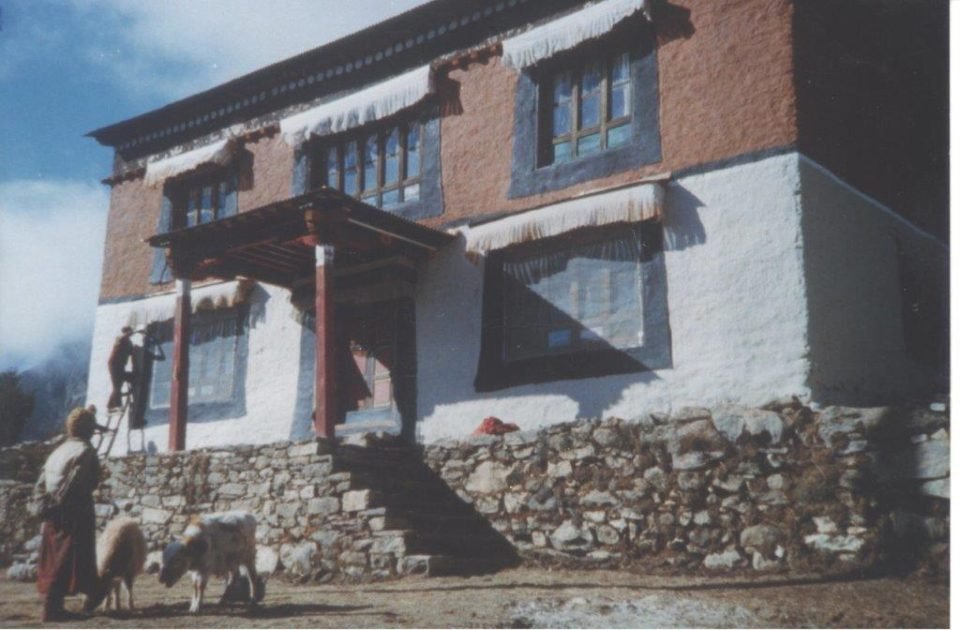
The Lawudo Temple, 1984. Photo courtesy of Michelle Le Dimna.
Michelle Le Dimna arrived in Kopan for the 1978 November course and stayed in Nepal and India following teachings and doing retreat until February 1985. Michelle has spent about 40 years translating Dharma books into French. She was instrumental in organizing relic tours in France and Belgium and helped with fundraising for the Maitreya Project.
Below is Michelle Le Dimna’s account of her visit to Solu Khumbu in 1984-1985 and her three-month winter retreat in Lawudo.
This story was first published in the Love Lawudo quarterly newsletter #5 in 2019.
Rinpoche’s Advice and the Hardships of Getting to Lawudo
After Lama [Yeshe] passed away, I had the opportunity to have a long interview with [Lama Zopa] Rinpoche. It was the first time I could really accept whatever he would tell me to do. First, he sent me to Namo Buddha for a month’s retreat, then he told me to go for a three-month retreat at Lawudo. It’s difficult nowadays to imagine a world without the internet and even without a phone. I had no idea what I would find there, and I couldn’t tell anyone in Lawudo that I was coming. So, while waiting in Kathmandu at the end of the monsoon, I prepared what I thought would be necessary for my survival: a stove and kerosene. I remember not knowing whether Ani Samten [Lama Zopa Rinpoche’s sister] would be able to cook for me.
I took a bus from Kathmandu, but it didn’t get very far because a landslide had cut the road off, so I found myself at night in a shop, looking for a porter to help me to carry my load to Lawudo. A Nepali man said he would do it. I noticed that he was wearing smart shoes, but he was the only choice I had. After one day’s walk, he asked me for his money and made his escape without any warning in the early morning. I then found a young guy in the village, with bare feet, wearing very light white clothing, who was quite poor but also quite strong. As the nights were getting cool, I started to lend him my shawl, but after a few days I noticed I had got a lot of body lice which were quite hard to get rid of! He would only eat potatoes as he wanted to save as much money as possible. As he was not a talkative or noisy one, it was really nice to walk with him, day after day. It took maybe ten days in total to reach Namche. I felt very sorry that I was not able to give him as much money as he deserved, but there were no banks there and I had to keep enough for the three months to come.
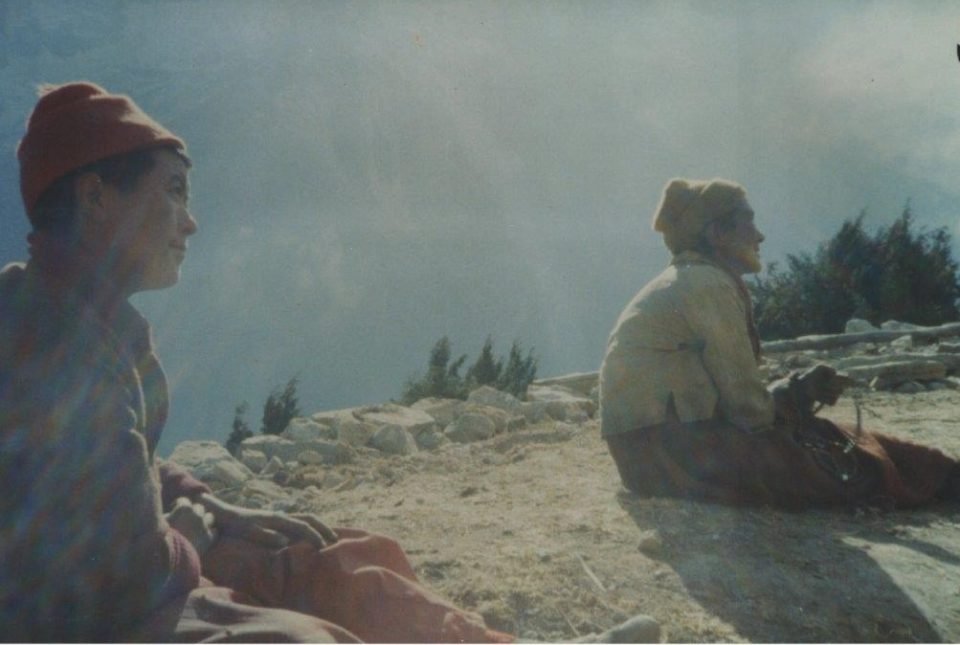
Ani Samten (Lama Zopa Rinpoche’s sister) and Amala (Lama Zopa Rinpoche’s mother), Lawudo, 1984. Photo courtesy of Michelle Le Dimna.
The Difficulties and the Joys of Being at Lawudo
I bought butter and tsampa at the Namche market—it would be my daily breakfast—but the butter was not clean and there was a lot of moisture in it. It certainly didn’t help my stomach problems and I had dysentery during my whole stay because of amoebas and other parasites. I met Ani Samten and the monk from Kopan who was helping her, at the market and we walked together to Lawudo. Ani Samten was about my age, and I considered her as a sister. The relationship was easy and warm, we could communicate with our broken English.
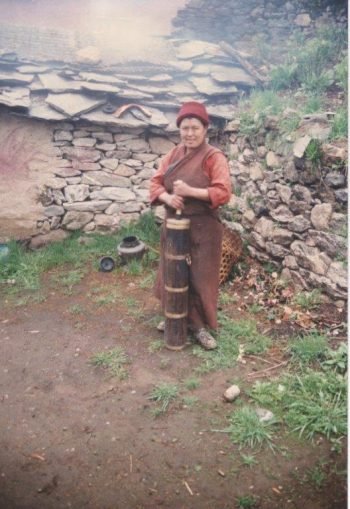
Ani Samten preparing butter tea, 1984. Photo courtesy of Michelle Le Dimna.
With Amala [Lama Zopa Rinpoche’s mother], we only had a dozen of Tibetan words to communicate in: yapodu, yapomindu, tsutiche, mambo tsutiche and so on. Anyway, she was continuously reciting loudly OM MANI PADME HUM. The only conversations we had were concerning Rinpoche. She reminded me of my mother who had to bear not having news of her daughter for so long.
I had lunch with Amala and Ani Samten every day. I enjoyed eating potatoes every day very much. I love potatoes and am very used to them because I come from Bretagne [France]. They were very tasty with erma (timut in Nepali), chili sauce, and butter, of course. The potatoes would be sliced and dried in the sun or else placed in a big hole in the ground so that they wouldn’t get frozen. Every evening I went back to the kitchen for a short while just to enjoy a tea and sit by the fireplace.
I was staying in a room just above the gompa and wearing my down jacket day and night. In December for sure, but maybe even before that, the water became frozen. The sun was hot during the day, so I don’t think I suffered from the cold. At night, sometimes I would sit outside and look at the sky. At the beginning I was very surprised to see so many shooting stars. They were very close and once I could hear the sound of a meteorite falling down very nearby. I thought I would be able to find it the next day, but it didn’t happen. It felt like magic, but actually it was simply because the meteorites were catching fire while entering into the atmosphere and the atmosphere is not far above at that altitude.
At the end of my retreat I allowed myself to tour around a bit. I had the opportunity to have a meeting with Charok Lama, using my poor words of Hindi and Tibetan! Another time, I went down to Thami, the village where Rinpoche was born. I also participated in a few pujas at the nunnery down below, which was very powerful. I am full of memories!
Remembering Death
Throughout the three months, only once did a group of trekkers visit Lawudo. Other than that, I saw no other Westerners. They were French, so we had a bit of a conversation. A week later, when Ani Samten came back from the market in Namche, she told me that one lady from this group had fallen down from the path and died. I was shocked. And it reminded me how strongly I felt the presence of death when I was preparing for my trip to Lawudo. Lama Lhundrup especially insisted very much that I should remember death at all times. He told me that Zina also went to the Himalayas for retreat, but she died up there before finishing it, so I had to be ready, he said something like that.
Dreaming of a Nice Hot Shower
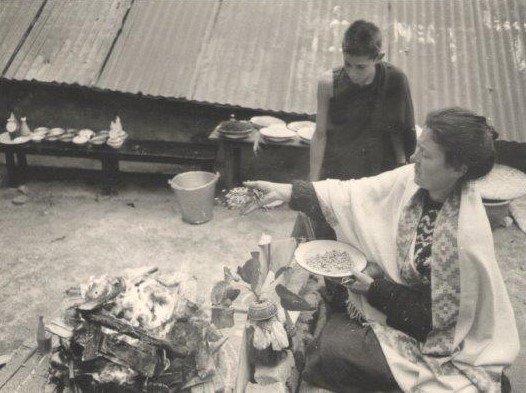
Michelle Le Dimna fire puja at Kopan Monastery at the end of her three month retreat at Lawudo, 1985. Helped by young Daja Wangchuk. Photo courtesy of Michelle Le Dimna.
When the first snowfall came, I had to think of getting back down from the mountains. Ani Samten filled up my rucksack with crushed aromatic plants such as juniper, which came to 21 kilos. But when I started to make my way back, I had so much energy that I was running all the time. It didn’t take me long to get to Kathmandu, a week if I remember well. I was in such a dirty state that on my way I was dreaming more and more of a hot shower and when I arrived at my regular hotel, The Blue Star, I went straight to the shower. I put on the soap, but either the water was cold or there was no water! Strong expectations but big laughter, rather than big disappointment. When I was back in Kopan—where I performed the fire puja—Rinpoche invited me for a Sherpa meal one-to-one as he wanted to have fresh news of his family.
So that was my experience of doing retreat at Lawudo. Years later, when I read The Lawudo Lama I realized that I had no idea of the power of the place, it was incredible! So, this is just my small story at my level. But I feel very grateful to have been given this opportunity and to have had this connection.
Please consider subscribing to the Lawudo newsletter which is published four times each year on the major holy days. For more information about Lawudo Gompa and Retreat Center, please visit the Lawudo Gompa website. You can also follow Lawudo on Facebook.
FPMT.org brings you news of Lama Zopa Rinpoche and of activities, teachings, and events from over 150 FPMT centers, projects, and services around the globe. If you like what you read, consider becoming a Friends of FPMT member, which supports our work.
- Tagged: lawudo, lawudo chronicles, michelle le drimna
- Home
- News/Media
- Study & Practice
- About FPMT Education Services
- Latest News
- Programs
- New to Buddhism?
- Buddhist Mind Science: Activating Your Potential
- Heart Advice for Death and Dying
- Discovering Buddhism
- Living in the Path
- Exploring Buddhism
- FPMT Basic Program
- FPMT Masters Program
- FPMT In-Depth Meditation Training
- Maitripa College
- Lotsawa Rinchen Zangpo Translator Program
- Universal Education for Compassion & Wisdom
- Online Learning Center
- Prayers & Practice Materials
- Overview of Prayers & Practices
- Full Catalogue of Prayers & Practice Materials
- Explore Popular Topics
- Benefiting Animals
- Chenrezig Resources
- Death & Dying Resources
- Lama Chopa (Guru Puja)
- Lama Zopa Rinpoche: Compendium of Precious Instructions
- Lama Zopa Rinpoche: Life Practice Advice
- Lama Zopa Rinpoche Practice Series
- Lamrim Resources
- Mantras
- Prayer Book Updates
- Purification Practices
- Sutras
- Thought Transformation (Lojong)
- Audio Materials
- Dharma Dates – Tibetan Calendar
- Translation Services
- Publishing Services
- Teachings and Advice
- Find Teachings and Advice
- Lama Zopa Rinpoche Advice Page
- Lama Zopa Rinpoche: Compendium of Precious Instructions
- Lama Zopa Rinpoche Video Teachings
- ༧སྐྱབས་རྗེ་བཟོད་པ་རིན་པོ་ཆེ་མཆོག་ནས་སྩལ་བའི་བཀའ་སློབ་བརྙན་འཕྲིན།
- Podcasts
- Lama Yeshe Wisdom Archive
- Buddhism FAQ
- Dharma for Young People
- Resources on Holy Objects
- Ways to Offer Support
- Centers
- Affiliates Area
- Teachers
- Projects
- Charitable Projects
- Make a Donation
- Applying for Grants
- News about Projects
- Other Projects within FPMT
- Support International Office
- Projects Photo Galleries
- Give Where Most Needed
- FPMT
- Shop
Translate*
*powered by Google TranslateTranslation of pages on fpmt.org is performed by Google Translate, a third party service which FPMT has no control over. The service provides automated computer translations that are only an approximation of the websites' original content. The translations should not be considered exact and only used as a rough guide.Approaching enlightenment is a gradual process, but once you attain it, there’s no going back; when you reach the fully awakened state of mind, the moment you experience that, you remain enlightened forever.







